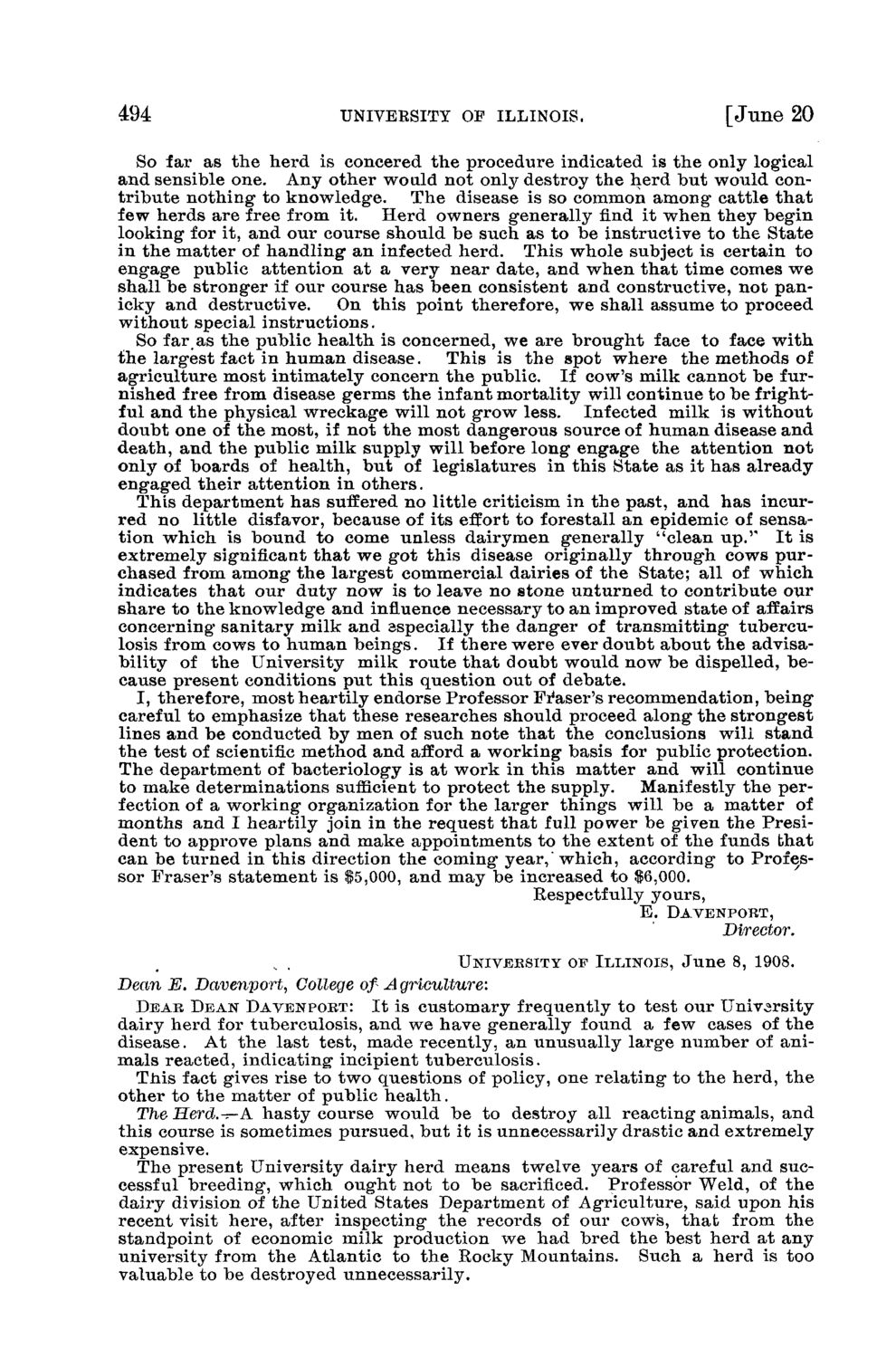| |
| |
Caption: Board of Trustees Minutes - 1908
This is a reduced-resolution page image for fast online browsing.

EXTRACTED TEXT FROM PAGE:
494 UNIVERSITY OF ILLINOIS. [June 20 So far as the herd is concered the procedure indicated is the only logical and sensible one. Any other would not only destroy the herd but would contribute nothing to knowledge. The disease is so common among cattle that few herds are free from it. Herd owners generally find it when they begin looking for it, and our course should be such as to be instructive to the State in the matter of handling an infected herd. This whole subject is certain to engage public attention at a very near date, and when that time comes we shall be stronger if our course has been consistent and constructive, not panicky and destructive. On this point therefore, we shall assume to proceed without special instructions. So far as the public health is concerned, we are brought face to face with the largest fact in human disease. This is the spot where the methods of agriculture most intimately concern the public. If cow's milk cannot be furnished free from disease germs the infant mortality will continue to be frightful and the physical wreckage will not grow less. Infected milk is without doubt one of the most, if not the most dangerous source of human disease and death, and the public milk supply will before long engage the attention not only of boards of health, but of legislatures in this State as it has already engaged their attention in others. This department has suffered no little criticism in the past, and has incurred no little disfavor, because of its effort to forestall an epidemic ofv sensation which is bound to come unless dairymen generally "clean up. I t is extremely significant that we got this disease originally through cows purchased from among the largest commercial dairies of the State; all of which indicates that our duty now is to leave no stone unturned to contribute our share to the knowledge and influence necessary to an improved state of affairs concerning* sanitary milk and especially the danger of transmitting tuberculosis from cows to human beings. If there were ever doubt about the advisability of the University milk route that doubt would now be dispelled, because present conditions put this question out of debate. I, therefore, most heartily endorse Professor Fi-aser's recommendation, being careful to emphasize that these researches should proceed along the strongest lines and be conducted by men of such note that the conclusions will stand the test of scientific method and afford a working basis for public protection. The department of bacteriology is at work in this matter and will continue to make determinations sufficient to protect the supply. Manifestly the perfection of a working organization for the larger things will be a matter of months and I heartily join in the request that full power be given the President to approve plans and make appointments to the extent of the funds that can be turned in this direction the coming year,' which, according to Professor Eraser's statement is $5,000, and may be increased to $6,000. Respectfully yours, E. DAVENPORT, Director. s . UNIVERSITY OP ILLINOIS, J u n e 8, 1908. Dean E. Davenport, College of- Agriculture: DEAR DEAN DAVENPORT: I t is customary frequently to test our University dairy herd for tuberculosis, and we have generally found a few cases of the disease. At the last test, made recently, an unusually large number of animals reacted, indicating incipient tuberculosis. This fact gives rise to two questions of policy, one relating to the herd, the other to the matter of public health. The Herd.—A hasty course would be to destroy all reacting animals, and this course is sometimes pursued, but it is unnecessarily drastic and extremely expensive. The present University dairy herd means twelve years of careful and successful breeding, which ought not to be sacrificed. Professor Weld, of the dairy division of the United States Department of Agriculture, said upon his recent visit here, after inspecting the records of our cows, that from the standpoint of economic milk production we had bred the best herd at any university from the Atlantic to the Rocky Mountains. Such a herd is too valuable to be destroyed unnecessarily.
| |